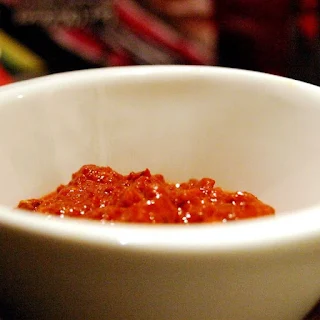Hot chili peppers, also known as chilies, are a popular spice used in many cuisines in Africa.
Fast hot and spicy seasoning Harissa spice paste is known as the devil hot pepper seasoning made from the hottest ground red peppers.
Harissa is the basic seasoning used in North African and Middle Eastern cooking and is extremely hot but good. Harissa is typically made hot and served with vegetables, grilled meats and couscous.
Harissa pepper spice recipe
 |
| Harissa Paste |
Make Harissa devil hot 5-Minute homemade spicy seasoning with step-by-step directions.
Ingredients
½ cup extra virgin olive oil
2 African bird hot peppers, diced, do not remove the seeds. You can use red Thai chili peppers instead.
1 tablespoon ghost chili powder
1 garlic clove, chopped
2 tablespoons cumin seeds, toasted
1 tablespoon coriander seeds
1 cup sun-dried tomatoes, chopped
Small handful of coriander leaves, chopped
1 tablespoon fresh lemon juice
1 teaspoon fine sea salt
Directions
Lightly toast the cumin and coriander seeds in a small frying pan over medium heat, stirring often, until fragrant around 2-3 minutes. Remove from the heat and set aside to cool. Add the cooled seeds with the remaining ingredients in a blender and blend until smooth. Serve with vegetables, grilled meat, chicken or flat bread.
More good recipes.
- African Mexican Salsa

- Learn how to cook buttermilk fried yams

-
Recipe of peppered goat

- San Pedro African Seafood Recipe

-
Nigerian Breakfast Fried Akara and Ogi
















